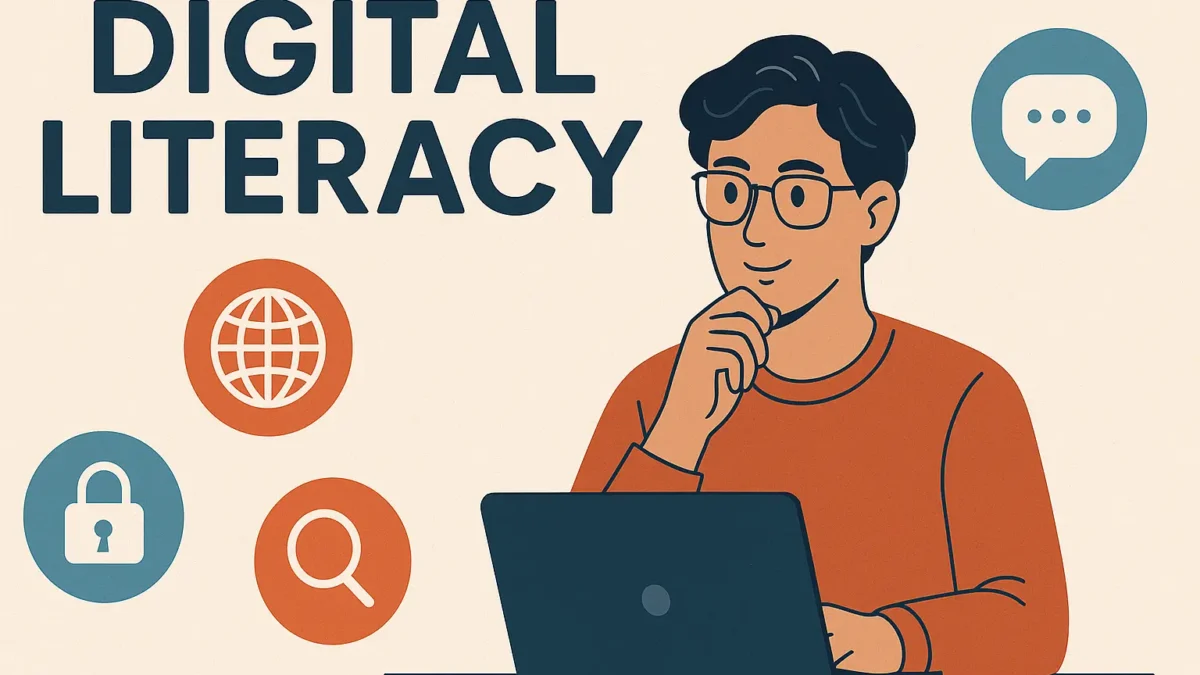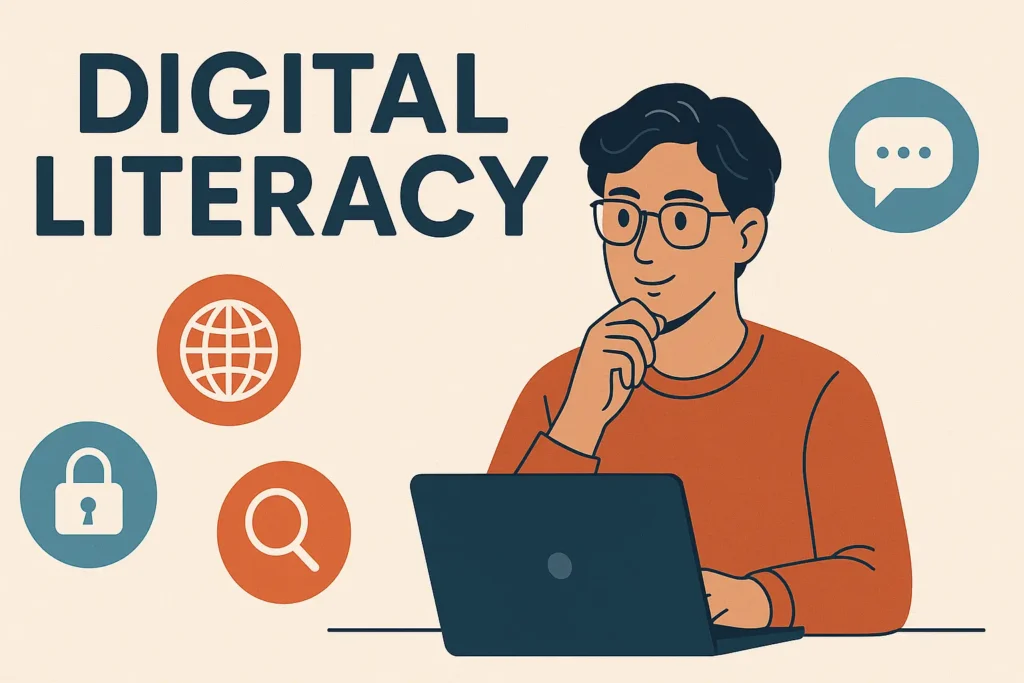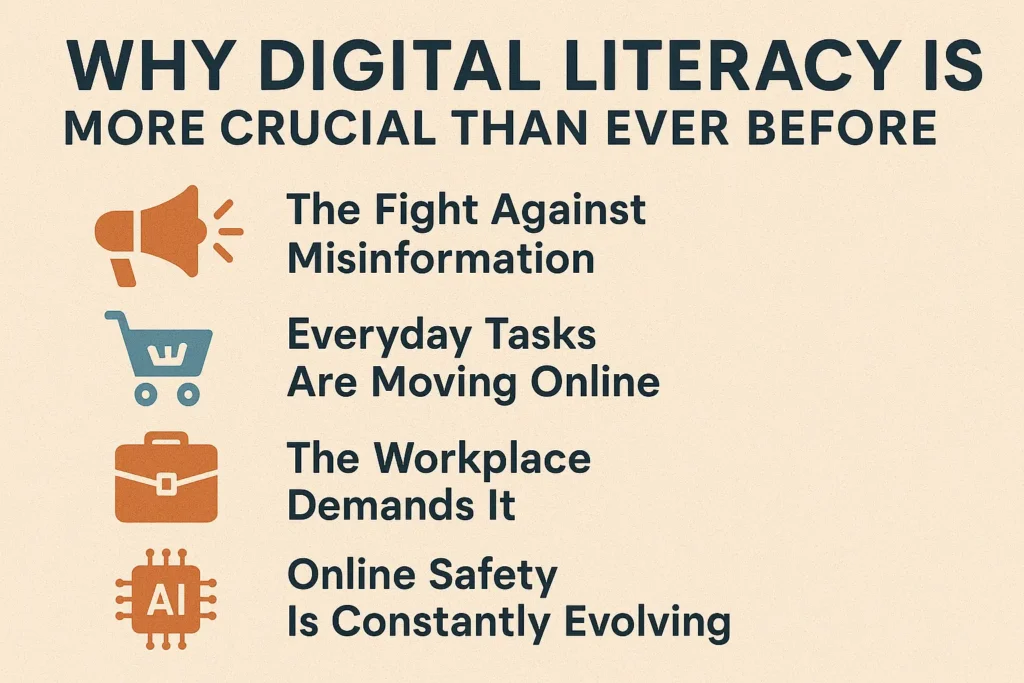
Digital Literacy: Critical Skill You Need for Online Safety

Introduction: The Underrated Superpower of the Digital Age
In today’s hyper-connected world, where nearly every part of our daily lives touches a screen—whether it’s for work, shopping, education, or entertainment—being comfortable with technology is no longer a luxury. But there’s a skill even more important than using a smartphone or app: digital literacy.
Digital literacy is about much more than just clicking and scrolling. It’s the ability to think critically online, use digital tools effectively, stay safe, and navigate the digital world with confidence. Moreover, as technology advances, developing strong digital literacy isn’t just smart—it’s absolutely essential.
Key Highlights:
- Digital literacy is essential for safe, smart tech use.
- Helps fight misinformation and fake content.
- Needed in modern jobs and remote work.
- Protects your privacy and online security.
- Social media literacy helps avoid algorithm traps.
- Anyone can build it with free tools and habits.
- It’s a lifelong skill that evolves with technology.
You can also read our recent articles on Bitcoin Stays Strong Amid Tariff, Tariff, Trade War and Recession, Nvidia AI Powerhouse, DeepSeek’s AI Power, China’s AI shocks the Tech World and LinkedIn Games
What Exactly Is Digital Literacy?
Digital literacy refers to a wide set of skills that help people use technology in informed, safe, and productive ways. It includes things like:
- Knowing how to find trustworthy information on the internet
- Using apps, websites, and digital tools to solve everyday problems
- Communicating clearly and respectfully in digital spaces
- Recognizing online threats like phishing scams or data breaches
- Understanding how platforms and algorithms shape what we see online
Most importantly, digital literacy is about staying adaptable in a world where technology is always changing. It’s less about mastering every tool and more about learning how to learn in digital spaces.
Why Digital Literacy Is More Crucial Than Ever Before

1. The Fight Against Misinformation
The internet is overflowing with information; however, not all of it is accurate. From viral fake news to AI-generated content that looks real, being digitally literate enables individuals to distinguish truth from noise. Furthermore, knowing how to evaluate sources and verify claims has become one of the most powerful aspects of digital literacy today.
2. Everyday Tasks Are Moving Online
Banking, booking appointments, applying for jobs, accessing healthcare—it’s all online. As a result, for those without basic digital literacy, even simple tasks can become significant barriers. Therefore, strengthening these skills is crucial to ensure that people from all backgrounds can participate fully in modern life.
3. The Workplace Demands It
Digital literacy is now a core requirement for most jobs. Whether it’s sending professional emails, organizing files in the cloud, or using project management tools, today’s workers are expected to be digitally fluent. The more confident you are with digital platforms, the more opportunities you unlock.
4. Online Safety Is Constantly Evolving
Cyber threats are everywhere—from fake messages pretending to be your bank to apps collecting data without your knowledge. Consequently, being digitally literate means knowing how to protect your identity, use strong passwords, recognize suspicious links, and browse more securely.
5. Navigating the Rise of AI
Artificial intelligence is becoming a big part of our digital lives. Tools that generate text, images, or even video are now easily accessible. Digital literacy helps you understand how these tools work, when to trust them, and how to use them responsibly.
The Key Areas of Digital Literacy
1. Evaluating Information Online
Can you tell if a website is credible? Do you double-check facts before sharing them? Digital literacy starts with information awareness—learning to question headlines, investigate sources, and look beyond surface-level content.
2. Mastering Digital Tools
Tools like Zoom, Canva, Notion, or Google Workspace aren’t just for tech experts. They’re everyday essentials. Knowing how to use digital tools not only boosts productivity but also increases your flexibility in work and learning environments.
3. Communicating Effectively in Digital Spaces
From work emails to social media replies, tone and clarity matter. In addition, part of being digitally literate is understanding digital etiquette knowing how to express yourself professionally, avoid misunderstandings, and interact respectfully online.
4. Strengthening Online Security Habits
Do you reuse passwords, click on unfamiliar links, or share too much on social platforms? If so, digital literacy involves learning simple habits that protect your privacy and keep your data safe. For example, enabling two-factor authentication and reviewing app permissions are effective ways to enhance your online security.
5. Understanding Social Media Algorithms
Social platforms decide what we see, shaping our opinions and even our emotions. As a result, a digitally literate person understands how these algorithms work and takes control by curating their feed, managing screen time, and being mindful of digital consumption.
How to Build Your Digital Literacy Skills Today
You don’t need a tech degree to get better at navigating the digital world. Here are some simple, practical ways to grow your digital literacy:
1. Enroll in Free Online Learning Programs
Websites like Google Digital Garage, Coursera, and LinkedIn Learning offer excellent free courses that teach essential digital skills—from cybersecurity to email etiquette.
2. Follow Digital Educators and Tech Guides
Content creators on YouTube, Instagram, and Twitter often break down digital tools, scams, and tech trends in digestible ways. Therefore, subscribing to a few that align with your learning style allows you to stay updated passively.
3. Make Fact-Checking a Habit
Don’t share everything you see—especially if it sounds too good (or bad) to be true. Use fact-checking websites like Snopes or Reuters Fact Check to verify information quickly.
4. Explore New Tools Regularly
Pick one new tool or app a month and experiment with it. Maybe it’s a note-taking app like Notion, a design tool like Canva, or a productivity booster like Trello. Each one adds to your digital literacy toolbox.
5. Talk About It With Others
Helping a family member avoid a phishing scam or showing a friend how to use a password manager doesn’t just help them—it also reinforces your own digital literacy. Moreover, learning together builds collective knowledge.
Final Thoughts: Digital Literacy Is a Lifelong Skill
In today’s digital-first world, the ability to navigate technology with confidence is one of the most important skills you can have. Digital literacy is no longer optional—it’s the foundation of how we learn, work, connect, and stay safe online.
You don’t need to know everything. You just need to stay curious, ask good questions, and build habits that keep you informed, empowered, and in control.
Because being online is easy—but being digitally literate? That’s what truly sets you apart.
Frequently Asked Questions (FAQ)
1. What is digital literacy, and why is it important?
Digital literacy is the ability to use digital tools, evaluate information online, communicate effectively, and stay safe in digital environments. As a result, it’s essential for work, learning, and everyday life in today’s tech-driven world.
2. How does digital literacy help prevent misinformation?
It teaches you how to spot fake news, verify sources, and think critically about online content—especially important with AI-generated information and deepfakes on the rise.
3. What are the key skills included in digital literacy?
Core skills include using productivity tools, managing cybersecurity, understanding digital etiquette, evaluating information, and navigating social media and algorithms wisely.
4. Can digital literacy be learned at any age?
Absolutely. Whether you’re a student, professional, or retiree, digital literacy can be developed through free courses, tutorials, and everyday practice.
5. What are some free ways to improve digital literacy?
You can take free courses from Google Digital Garage, Coursera, or LinkedIn Learning. YouTube tutorials, tech blogs, and fact-checking habits also help build your skills.
